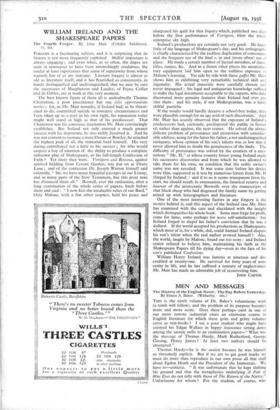WILLIAM IRELAND AND THE SHAKESPEARE PAPERS
FORGERY is a fascinating subject, and it is surprising that its history is not more frequently exploited. Skilful imposture is always engaging ; and even when, as so often, the dupes are seen in retrospect to have been astonishingly credulous, the reader at least experiences that sense of superiority from whose warmth few of us are immune. Literary forgery is almost as old as literature itself, and it has flourished so consistently, in hands distinguished and undistinguished, that we may be sure the successors of Macpherson and Lauder, of Payne Collier and de Gibler, are at work at this very moment.
The best known figure of them all is undoubtedly Thomas Chatterton, a poor practitioner but one felix opportunitate mortis ; for, as Mr. Mair remarks, if Ireland had, as he threat- ened to do, committed suicide in romantic circumstances and been taken up as a poet in his own right, his reputation today might well stand as high as that of his predecessor. That Chatterton was his conscious inspiration Mr. Mair convincingly establishes. But Ireland not only enjoyed a much greater success with his imposture, he also richly deserved it. And he was not content to recreate a mere Ossian or Rowley, he attacked the highest peak of all, the immortal bard himself. His very daring contributed not a little to his success ; for who would suspect a boy of nineteen of the ability to produce a complete unknown play of Shakespeare, or his full-length Confession of Faith ? Yet there they were. Vortigern and Rowena, against spirited bidding from Covent Garden, was put on at Drury Lane ; and of the confession Dr. Joseph Warton himself said solemnly, " Sir, we have many beautiful passages hi our Litany, and in many parts of the New Testament, but this great man has distanced them all." Boswell, ever the enthusiast, after a long examination of the whole series of papers, knelt before them and said : " I now kiss the invaluable relics of our Bard." Only Malone, with a few other sceptics, held his peace and sharpened his quill for that Inquiry which, published two days before the first performance of Vortigern, blew the whole enterprise sky high.
Ireland's productions are certainly not very good. He knew little of the language of Shakespeare's day, and his orthokraphy is chiefly characterised by the reckless duplication of consonants and the frequent use of the final e, in and (more often) out of place. He made a certain number of factual mistakes, of dates, titles, names, &c. And in a dozen other places his unsatisfac- tory equipment laid him open to the ruthless exposure of Malone's learning. Yet side by side with these gaffes Mr. Mair shows him as exhibiting very remarkable technical skill and ingenuity. His actual materials were carefully chosen and never impugned : his legal and antiquarian knowledge sufficed to make the legal documents acceptable to the experts, who duly discovered more genuine features than Ireland had ever put into them : and his style, if not Shakespearian, was a fairly skilful pastiche.
If the results would hardly deceive a school-boy today, they were plausible enough for an age avid of such discoveries. ' And Mr. Mair has acutely observed that the exposure of Ireland's predecessors had, curiously, predisposed the public in favour of, rather than against, the next comer. He solved the always delicate problem of provenance and promotion with consider- able address, using for the latter his father, a not undistinguished antiquary, whose opinion of his son's talents was so low that it never allowed him to doubt the genuineness of the finds. The difficulty of provenance was solved by the creation of a mys- terious " Mr. H," at whose country house young Ireland made his successive discoveries and from which he was allowed to take them for his own, on condition that the noble owner's name was not revealed. It was some time before his device wore thin, supported as it was by numerous letters from Mr. H (forged by Ireland) : and if to us it seems transparent from the start, we should recall, in extenuation, the fanatical reserve and hauteur of the aristocratic Boswells over the manuscripts of that black sheep who had disgraced the family name by getting mixed up with lexicographers and literature.
One of the most interesting factors in any forgery is the motive behind it, and this aspect of the Ireland case Mr. Mair has examined with the care and elucidated with the insight which distinguishes his whole book. Some men forge for profit, some for fame, some perhaps for mere self-satisfaction : but Ireland forged to dispel his father's conviction that he was a dullard. If the world accepted his productions as Shakespeare, which most of it, for a while, did, could Samuel Ireland dispute his son's talent when the real author avowed himself ? Alas, the world, taught by Malone, found out too soon : and Ireland senior refused to believe him, maintaining his faith in the Shakespeare Papers till his dying day—even in the face of his son's published Confessions.
William Henry Ireland was famous at nineteen and dis- credited at twenty-one. He survived for forty years of non- entity in life, and he has suffered a century of neglect since. Mr. Mair has made an admirable job of resurrecting him.
join,' CARTER.






































 Previous page
Previous page